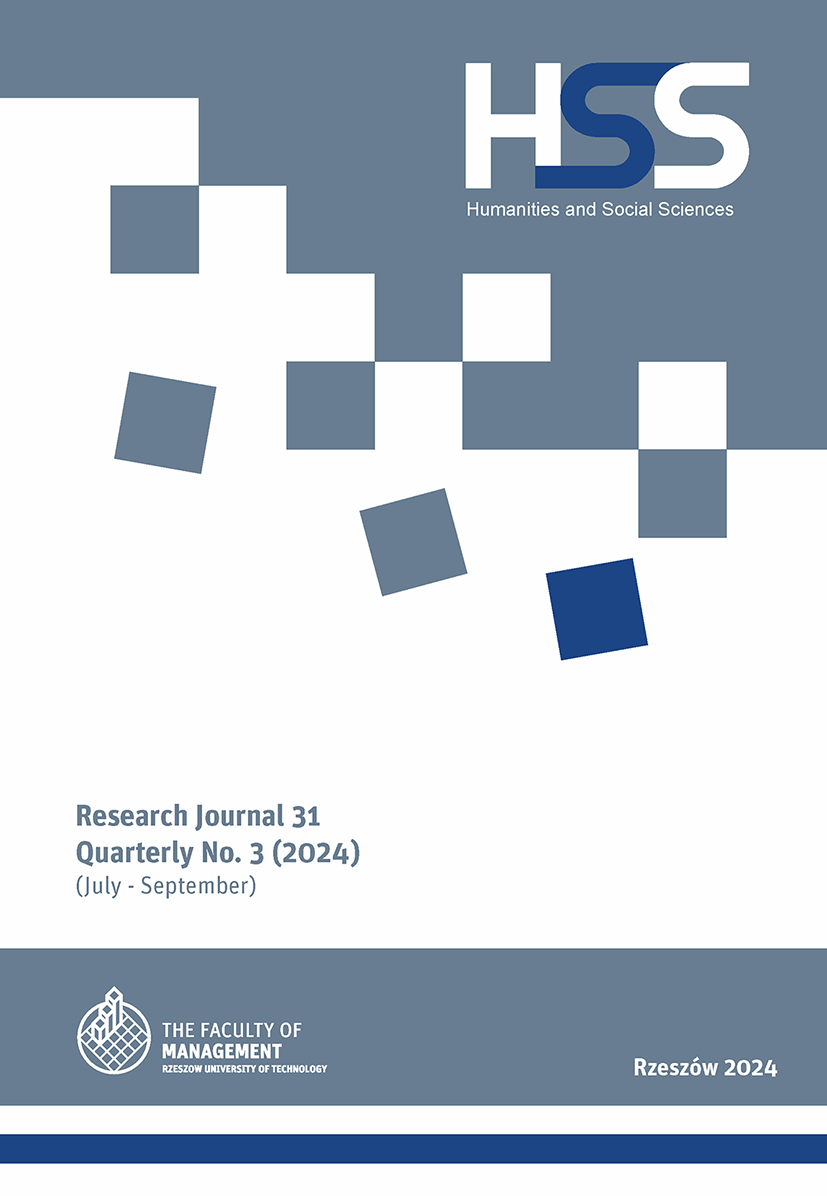Abstract
The purpose of this study is to identify the relationship between holding a disability certificate and job discrimination. The motivation for conducting this research is to identify a research gap relating to the insufficient recognition of the issue of dysfunction in human resource management, namely, the discrimination of individuals with disabilities by employers. This paper presents the results of a survey conducted on a sample of 148 people. The results of the nonparametric significance tests are discussed. Contrary to the subjective feelings of the surveyed population, the study found that, in selected areas, both the degree and character of a disability significantly correlate with job discrimination by employers.
References
Ballo, J.G. (2023). Is the disability wage gap a gendered inequality? Evidence from a 13-year full population study from Norway.“Social Science & Medicine”, 331. DOI: 10.1016/j.socscimed.2023.116077.
Choi, G.S., Storr, V.H. (2023). The morality of markets in theory and empirics. “Journal of Economic Behavior & Organization”, 216. DOI: 10.1016/j.jebo.2023.09.019.
Czajkowska, A., Ingaldi, M. (2023). Analysis of the survey results on the pro-ecological awareness of young people in the aspects of sustainable development.“Management Systems in Production Engineering”, 31(3). DOI: 10.2478/mspe-2023-0035.
Doroszewski, W., ed. (1962). Dictionary of the Polish language. Warsaw: PWN Scientific Publishers.
Gąciarz, B. (2014). Social integration and professional activation of disabled people living in small towns and rural areas: determinants of success and failure: a research report. Warsaw: Wydawnictwo IFiS PAN.
Giermanowska, E., Kumaniecka-Wiśniewska, A., Racław, M., Zakrzewska-Menterys, E. (2015). Entry of disabled university graduates into the labour market. Warsaw: University of Warsaw Publishing House.
Goffman, E. (2005). Stigma. Reflections on wounded identity.Gdańsk: GWP.
Jolly, N.A., Wagner, K.L. (2023). Work-limiting disabilities and earnings volatility. “Labour Economics”, 81, DOI: 10.1016/j.labeco.2023.102333.
Kayama, M., Johnstone, C. & Limaye, S. (2019). Adjusting the “self” in social interaction: Disability and stigmatization in India. “Children and Youth Services Review”, 96. DOI: 10.1016/j.childyouth.2018.11.047.
Kildal, J., Martín, M., Ipiña, I., Maurtua, I. (2019). Empowering assembly workers with cognitive disabilities by working with collaborative robots: a study to capture design requirements. “Procedia CIRP”, 81, DOI: 10.1016/j.procir.2019.03.202.
Kim, E.J., Parish, S.L., Skinner, T. (2019). The impact of gender and disability on the economic well-being of disabled women in the United Kingdom: a longitudinal study between 2009 and 2014. “Social Policy & Administration”, 53(7). DOI: 10.1111/spol.12486.
Kiliańska, K., Pajęcki, M. (2022). Identification of customers’ purchasing behaviour profiles in the context of corporate social responsibility. “Scientific Papers of Silesian University of Technology – Organization and Management Series”, 162. DOI: 10.29119/1641-3466.2022.162.17.
Lorenti, A., Dudel, C., Hale, J.M., Myrskylä, M. (2020). Working and disability expectancies at older ages: The role of childhood circumstances and education. “Social Science Research”, 91. DOI: 10.1016/j.ssresearch.2020.102447.
Macdonald, D., Peacock, K., Dew, A., Fisher, K.R., Boydell, K.M. (2022). Photovoice as a platform for empowerment of women with disability. “SSM – Qualitative Research in Health”, 2. DOI: 10.1016/j.ssmqr.2022.100052.
Mikołajczyk-Lerman, G. (2013). Between exclusion and integration: realization of the rights of a disabled child and his family: a sociological analysis. Łódź: University of Lodz Publishing House.
Niedzielski, E. (2014). Selected employment problems of persons with disabilities. “Optimum. Economic Studies”, 2(68).
Parchomiuk, M. (2019). Research involving people with intellectual disabilities. Methodological and ethical issues. “Yearbooks of pedagogy”, 11(47). DOI: 10.18290/rped.2019.11.3-5.
Rymsza, M. (2013). Activism in social policy. Towards a reconstruction of European welfare states?. Published by the Institute of Philosophy and Sociology of the Polish Academy of Sciences.
Świątkowski, A.M. (2010). Polish labour law. Warsaw: Lexis Nexis Publishers.
Titchkosky, T. (2023). Disability and society: changing our frames of reference. Tierney, R.J., Rizvi, F., Ercikan, K., eds. (2023). International Encyclopedia of Education (Fourth Edition),Elsevier. DOI: 10.1016/B978-0-12-818630-5.12006-8.
Polish Act of 26 June 1974 Labour Code [Ustawa z dnia 26 czerwca 1974 r. Kodeks pracy] – consolidated text dated 16 June 2023 (Dz.U. poz. 1465).


